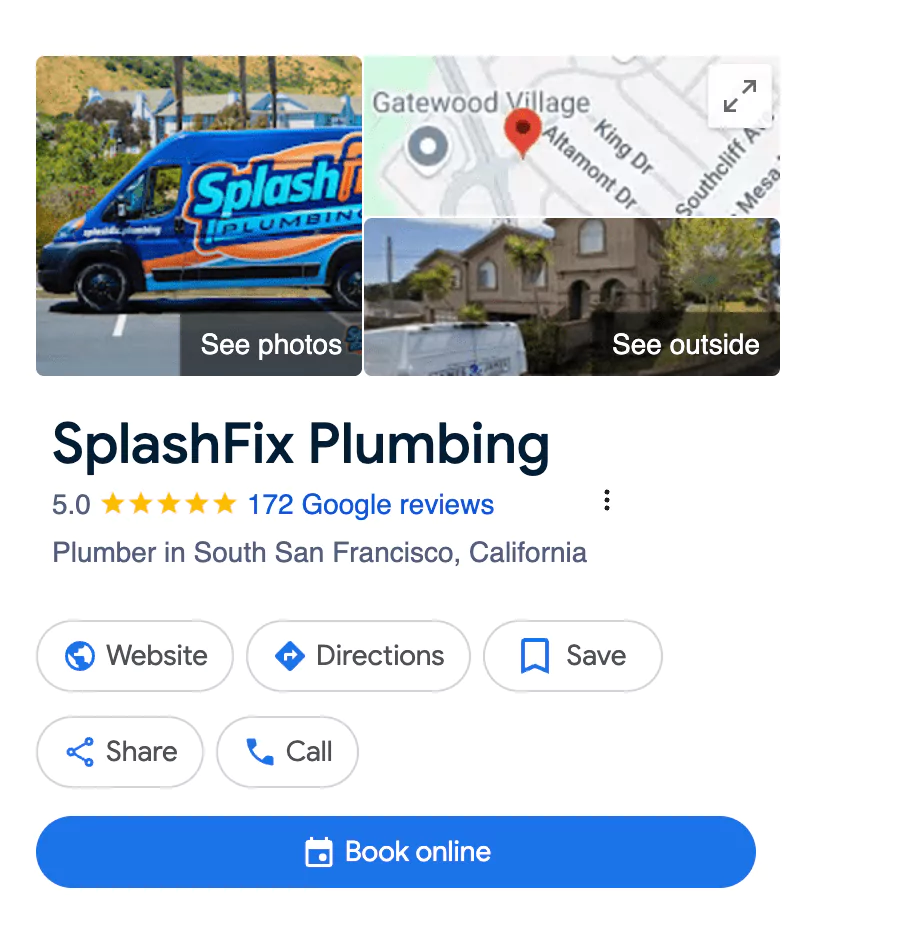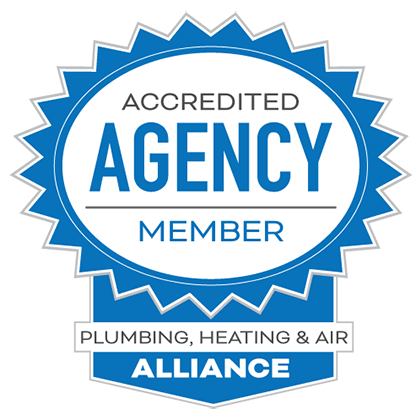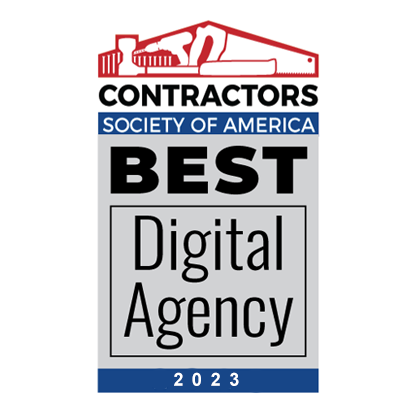Starting a plumbing business is an excellent investment in 2025, with the industry valued at $129.1 billion and continuing to grow.
That’s why the allure of becoming a self-employed business owner appeals to people who want to escape a grueling work schedule and an unpleasant boss.
However, starting a plumbing company requires more than job experience or being good with your hands.
As the founder and CEO of Plumbing Webmasters, a digital marketing agency for plumbers, I’ve worked with thousands of plumbing business owners over the past ten years.
Some of the traits these owners share are a dedication to business growth and a strong business foundation.
Based on my experience, I’ll outline 14 steps to starting a plumbing business in 2025.

1) Write a Business Plan
A business plan is the constitution of your plumbing company and sets the foundation for its future success.
Investors will only show interest in your company if you have a formidable business plan outlining your brand vision.
A plumbing business plan includes:
- Cover Page
- Executive Summary
- Business Overview
- Market Analysis
- List of Services
- Service Pricing
- Marketing Plan
- Financial Plan
2) Set Plumbing Business Goals
Successful companies set defined goals, and you should quickly identify your objectives for your plumbing business.
For example, consider your reasons for starting a plumbing company and your short and long-term vision for the brand.
Next, write down specific goals that can help you realize that vision. Use SMART goals, which are specific, measurable, achievable, relevant, and timed.
Examples of business goals include:
- Get 20 5-star Google Reviews within 3 months
- Convert $90,000 in sales within 12 months
- Hire at least three employees within 24 months
- Deploy a second plumbing truck within 36 months
Writing down these goals makes them tangible, and setting a time limit makes them urgent.
3) Find a Unique Value Proposition (UVP)
As the long-time owner of a digital marketing agency, I can save you a ton of headaches by revealing this early on: the plumbers who make it have a unique value proposition (UVP).
A UVP differentiates your company from local competitors by niching down or specializing in a specific service type or category.
Examples of UVPs for a plumbing business include:
- 24/7 Emergency Plumbing
- Community-Based Plumbing
- Rooter and Drain Specialists
- Water Heater Specialists
- Eco-Friendly Plumbing
- Cutting-Edge Plumbing Technology
- Veteran-Owned Business
- Black-Owned Business
- Women-Owned Business
Whatever your UVP, be sure to include it in your marketing materials, such as flyers, truck wraps, Google Business Profile, and website.
4) Study Local Government Regulation
The fastest way to ensure the failure of your plumbing company is to ignore local government regulations and plumbing codes, which can cause your dream to shatter before it gets started.
Failure to comply with local regulations can result in fines and the suspension of your license.
This State Plumbing Codes list outlines which plumbing code institution each U.S. state has adopted.
| State | Institution |
| Alabama | International Code Council (IPC) |
| Alaska | International Association of Plumbing and Mechanical Officials (UPC) |
| Arizona | International Code Council (IPC) |
| Arkansas | International Code Council (IPC) |
| California | International Association of Plumbing and Mechanical Officials (UPC) |
| Colorado | International Code Council (IPC) |
| Connecticut | International Code Council (IPC) |
| Delaware | International Code Council (IPC) |
| Florida | International Code Council (IPC) |
| Georgia | International Code Council (IPC) |
| Hawaii | Uniform Plumbing Code (UPC) |
| Idaho | Uniform Plumbing Code (UPC) |
| Illinois | Illinois Plumbing Code |
| Indiana | Indiana Plumbing Code; International Association of Plumbing and Mechanical Officials (UPC) |
| Iowa | International Association of Plumbing and Mechanical Officials (UPC); International Code Council (IPC) |
| Kansas | International Code Council (IPC) |
| Kentucky | Kentucky State Plumbing Code; National Plumbing Code Coordinating Committee |
| Louisiana | Louisiana State Plumbing Code |
| Maine | Maine Internal Plumbing Code |
| Maryland | International Code Council (IPC) |
| Massachusetts | Massachusetts Uniform State Plumbing Code |
| Michigan | International Code Council (IPC) |
| Minnesota | Minnesota Plumbing Code |
| Mississippi | International Code Council (IPC) |
| Missouri | International Association of Plumbing and Mechanical Officials (UPC) |
| Montana | International Association of Plumbing and Mechanical Officials (UPC) |
| Nebraska | International Code Council (IPC) |
| Nevada | International Code Council (IPC); International Association of Plumbing and Mechanical Officials (UPC) |
| New Hampshire | International Code Council (IPC) |
| New Jersey | National Standard Plumbing Code (NSPC) |
| New Mexico | New Mexico Plumbing Code; International Association of Plumbing and Mechanical Officials (UPC) |
| New York | International Code Council (IPC) |
| North Carolina | International Code Council (IPC) |
| North Dakota | International Code Council (IPC) |
| Ohio | International Code Council (IPC) |
| Oklahoma | International Code Council (IPC) |
| Oregon | Oregon Specialty Plumbing Code; International Association of Plumbing and Mechanical Officials (UPC) |
| Pennsylvania | International Code Council (IPC) |
| Rhode Island | International Code Council (IPC) |
| South Carolina | International Code Council (IPC) |
| South Dakota | International Association of Plumbing and Mechanical Officials (UPC) |
| Tennessee | International Code Council (IPC) |
| Texas | International Code Council (IPC) |
| Utah | International Code Council (IPC) |
| Vermont | International Code Council (IPC) |
| Virginia | International Code Council (IPC) |
| Washington | International Association of Plumbing and Mechanical Officials (UPC) |
| West Virginia | International Code Council (IPC) |
| Wisconsin | Wisconsin Statues, Comm 81-87, Plumbing Code |
| Wyoming | International Plumbing Code (IPC) |
5) Secure Financing
Startup companies without existing capital will need to secure financing to buy equipment, tools, insurance, and marketing services.
The following options can help finance new plumbing companies:
Friends or Family: Seek loans from family members or close friends.
Government Funding: Apply for funding programs at The Small Business Administration (SBA) for small business loans and investment capital.
Business Grants: Apply for grant programs by searching Grants.gov for up to applicable programs.
Banks: Apply for a small business loan or credit line from your bank.
Online Lenders: Explore online lenders like SmaratBiz, Fendera, LoanBuilder or OndDeck.
Credit Cards: Apply for a low-interest-rate credit card to ignite your cash flow and pay it off monthly.
After securing funding, open a business bank account to separate those funds from your personal finances. This will help you organize everything when filing taxes.
6) Register Your Plumbing Business
You must officially register your plumbing business with the local government before taking it to market. Doing so protects your personal assets from lawsuits aimed at your plumbing business.
The steps include:
Register your Business Name: Before officially registering, brainstorm your business name and search USPTO’s Trademark Electronic Search System (TESS) to ensure it is not already used.
Register as a Business Structure: You can register as a limited liability company (LLC), which is most common for local plumbing businesses, or as a sole proprietorship.
Apply for EIN: You must apply for an employer identification number (EIN) from the Internal Revenue Service to hire employees and adequately file taxes.
7) Get Your Plumbing License and Permits
Each local municipality has its own requirements for plumbing licensing and permits. Research your regional standards and contact the proper departments.
Usually, aspiring plumbers must demonstrate expertise by passing an exam, completing an apprenticeship, or completing a defined amount of work hours in an industry setting.
Additionally, individual plumbing jobs often require permits that ensure your service complies with safety standards and local building codes.
Ignoring licensing and permit requirements may lead to fines, service delays, and severe legal consequences.
Before starting a plumbing company, you can check out this guide to plumbing licenses to get a better idea of what is required in your state.
8) Set Up Accounting and Taxes
Your plumbing business will need a method for managing its finances through accounting and taxes. You can hire an accountant, invest in accounting software, or do both.
Various software tools, including some of the most popular CRMs for plumbers, help streamline accounting and tax preparation for plumbing companies.
However, most of these apps will require integration with separate accounting software, such as QuickBooks, Xero, Wave, or FreshBooks
Proper financial and tax management is essential to a thriving business, so you should strongly reconsider skipping these duties during your startup phase.
9) Invest in Plumbing Equipment
Without the proper tools and equipment, your business cannot perform services, which will likely become your most significant upfront cost.
As a service area business (SAB) that travels to clients, you’ll need a plumbing truck to store your tools and equipment.
The cheap route to purchasing tools creates a shaky foundation for your plumbing company, as your service quality will be hampered and noticeable to clients.
Instead, look at these items as assets rather than liabilities, which can help you reach your previously defined business goals.
Here are some of the essential tools and equipment to purchase:
Plumbing Tools
- Adjustable wrenches (crescents)
- Pipe grips for secure handling
- Pipe cutters for precise cutting
- Hacksaws for manual cutting tasks
- Cordless battery-powered toolset, including drills, impact drivers, saws, grinders, and screwdrivers
Plumbing Stock
- Fittings, including elbows, tees, couplings, and adapters
- Pipes, such as plastic and copper types
- Inlet valves for controlling water flow
- Various tap fittings and accessories
- Hot water cylinder control valves
Heating and Hot Water Components
- Thermostats for temperature control
- Heating elements for water heaters and appliances
10) Set Service Prices
Setting your initial service prices involves more than simply calculating labor, material, and overhead costs—you must project baseline profit margins to ensure they align with your financial objectives.
List your fixed costs, such as tools, insurance, and utilities, followed by your variable costs, like transportation and marketing. Then, interject your previous plumbing experience and unique skill or service types.
Research other reputable plumbing companies in your service area to see what they charge for services. Competitor analysis helps your company stay within the market range to maximize conversions.
Underpricing your services can devalue your brand, and overpricing them can alienate your core consumer base. You can gradually raise your prices as you build your brand over time and generate more consistent leads.
Remember that your initial pricing is likely to evolve with your business, and I recommend reviewing your prices each quarter based on consumer feedback, operational costs, and market trends.
11) Hire Technicians
While some plumbers start as a one-man show, others with a long-term vision business hire technicians immediately.
The first step is identifying your ideal plumber (and person) to fill your initial technician positions. Write the job description in your own words and use a tool like Grammarly to edit the grammar.
Once you’ve edited your job description, create a job post on your website, Indeed, ZipRecruiter, and social media networks.
As you accumulate responses, begin meeting with select candidates for an interview. You can hire your initial technicians once you get a better feel for the candidates in person.
12) Invest in Plumbing Marketing
Laying the proper foundation for your plumbing business requires investing in the appropriate marketing channels and avoiding common pitfalls.
Unfortunately, far too many plumbers choose to exist in the “gig economy,” which involves buying leads from third-party lead sellers who use paid ads (PPC) to generate shared leads.
Choosing this route will likely result in your business going under within 5 years. The successful approach is partnering with a plumbing digital marketing agency for SEO, website design, and AI Overview optimization.
By creating a sustainable lead source through organic search results and Google Maps, you can consistently acquire the highest-quality plumbing leads in your marketing and enjoy massive profit margins.
Some of the most essential plumbing marketing tasks include:
- Custom Business Website
- Google Business Profile
- Organic SEO
- Social Media Marketing
- AI / LLMO Marketing (AI Overviews)

13) Get Your First Client
Your marketing investment will help you land your first client when they book your service through your custom business website or Google Business Profile.
While there are other ways to land your first client, such as word-of-mouth (through family or friends) or buying third-party leads, these are not worth celebrating because they don’t move your business forward.
When you land your first legitimate client through your digital brand, you will get a sense of your company’s potential and profit projections.
It would help to celebrate this accomplishment by taking your employees out to dinner.
14) Build a Sustainable Brand
Building a sustainable brand is the key to plumbing business success in 2025. I stress investing in digital branded assets like a website and organic web presence.
It would help if you started building your reputation by acquiring customer reviews on Google and Facebook and showcasing those reviews on your website.
Ensure you own your plumbing domain name and don’t use a subdomain from Wix or Weebly.
Furthermore, use your website to showcase real plumbing jobs and customer feedback to familiarize people with your company.
Brand building can extend to offline spaces in your local community, such as sponsoring local Little League teams or joining industry associations.
However, these offline events must be reflected in online behaviors, such as more people searching for your brand name online or institutions linking their websites to yours.
As your brand increases prominence over months, years, and decades, your lead quality and profitability will continue to rise.
How Much Money Do You Need to Start a Plumbing Business?
Most startup plumbing businesses need a minimum of $5,000 to start a small operation.
However, larger-scale operations with multiple employees and trucks can require as much as $200,000.
Check out a fictional estimate of business expenses below:
Sample Expenses:
License and Registration: $350
Tools and Equipment: $5,000
Insurance: $2,000
Truck: $30,000
Marketing: $2,500
Advertising: $3,000
Office Space: $12,000
Uniforms: $500
Sample Subtotal: $55,350
Remember, these are sample expenses, and yours will vary depending on your company’s size and scope. For instance, one-man shows may not require an office immediately, and having only one truck will reduce your upfront investment.
Consult with the business plan you created in step one to understand better how much money you’ll need to start your business. Always leave room for unforeseen costs like equipment damage and material pricing fluctuations.
How to Start a Plumbing Business Without Being a Plumber
Starting a plumbing business without being a plumber will require hiring a supervisor or master plumber with the proper local licensing.
Each state has varying regulations, sometimes deferred to cities, counties, or townships.
Some states don’t require state-level licensing for plumbers, but that does not mean your business can operate without a local license.
The following states don’t explicitly require state-level licensing for plumbers:
- Kansas
- Missouri
- Nebraska
- New York
- Pennsylvania
- Wyoming
Licensing may still be required at the city, county, or township level, though your local municipality must confirm those specifics.
This list of plumbing licensing requirements gives you a better idea of your State’s requirements.
Never rely solely on the internet or AI for a definitive answer, and double-check with your local municipalities before attempting to start a business.
Moving Forward With Your Plumbing Business in 2025
Starting a plumbing company in 2025 is an excellent investment that allows you to enter a growing industry valued at $129.1 billion.
While its prospects intrigue many, succeeding in this industry will require deliberate and strategic planning and a full-fledged commitment to building a sustainable business.
Use the 14 steps outlined in this article as a guide for starting your plumbing business on a solid foundation. It begins with a comprehensive business plan and pre-defining measurable goals.
Success in this industry is also dependent on a unique value proposition (UVP), compliance with local regulations, financial planning, and data-driven hiring.
Perhaps most importantly, running a profitable plumbing company means investing in digital marketing for plumbers. Avoid the pitfalls of buying third-party leads and neglecting your digital brand.
Instead, you should invest in a business website, SEO, Google Business Profile, brand signals, and AI Overviews optimization.
To discuss my experience helping plumbers start prosperous businesses in 2025, call my personal cell phone at (877) 388-9884.






